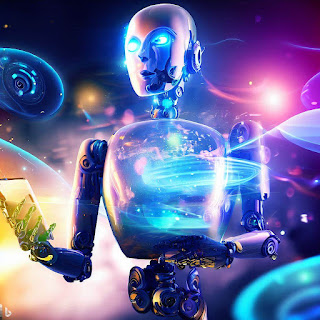In today's rapidly advancing world, technology is playing an increasingly significant role in shaping our lives. One visionary entrepreneur who has been at the forefront of technological innovation is Elon Musk. Through his various ventures, Musk has been unveiling a future where robots are set to revolutionize the modern world. This article delves into the rise of robots, Elon Musk's vision, their role in various industries, and the benefits and concerns associated with their integration.
 |
| The Role of Robots in the Modern World |
{getToc} $title={Table of Contents}
The Rise of Robots
Automation and Efficiency
With the rapid advancement of robotics and artificial intelligence (AI), robots are becoming increasingly capable of performing complex tasks once reserved for humans. The driving force behind this rise is the pursuit of automation and efficiency. Robots offer unparalleled precision, speed, and endurance, making them ideal for repetitive and physically demanding tasks.
Advancements in Robotics
Advancements in robotics have led to the development of versatile machines capable of mimicking human movements and interactions. From humanoid robots that can navigate complex environments to drones that can perform aerial inspections, the potential applications of these technologies are vast.
Elon Musk's Vision
Tesla and Self-Driving Cars
One of Elon Musk's most well-known ventures is Tesla, the electric vehicle manufacturer. Musk's vision for Tesla goes beyond clean energy transportation. He aims to bring about a future where self-driving cars powered by advanced AI algorithms become the norm. Such autonomous vehicles have the potential to reduce accidents, improve traffic flow, and enhance overall transportation efficiency.
SpaceX and Mars Exploration
SpaceX, another ambitious project by Musk, aims to revolutionize space exploration. The company envisions establishing a human colony on Mars. Robots play a crucial role in this endeavor, as they will be responsible for tasks such as constructing habitats, gathering resources, and conducting scientific experiments, paving the way for future human habitation.
Neuralink and Brain-Computer Interfaces
Neuralink, Elon Musk's neurotechnology company, focuses on merging the human brain with AI. By developing high-bandwidth brain-computer interfaces, Neuralink aims to enable humans to interact with machines seamlessly. This integration holds the potential to enhance human cognition, revolutionize healthcare, and even tackle neurological disorders.
The Boring Company and Tunnel Construction
The Boring Company, founded by Elon Musk, aims to revolutionize tunnel construction methods. By utilizing robotic technologies, the company envisions constructing tunnels at an unprecedented speed and cost efficiency. Such advancements can revolutionize transportation, enabling high-speed travel between cities and alleviating congestion on existing road networks.
Robots in Various Industries
Healthcare
Robots are increasingly being utilized in the healthcare industry to assist with surgeries, patient care, and medical research. Surgical robots, equipped with advanced imaging systems and precise instruments, allow surgeons to perform minimally invasive procedures with enhanced precision. Additionally, robotic exoskeletons assist patients with mobility impairments, enabling them to regain independence and improve their quality of life.
Manufacturing
In the manufacturing industry, robots have revolutionized production processes. They can perform repetitive tasks with high speed and accuracy, resulting in increased productivity and cost efficiency. Collaborative robots, known as cobots, work alongside human workers, enhancing safety and efficiency on assembly lines. Automation in manufacturing also allows for customization and flexibility in meeting consumer demands.
Agriculture
Robots have the potential to transform the agricultural sector by addressing labor shortages and increasing productivity. Agricultural robots can autonomously perform tasks such as planting, harvesting, and crop monitoring. They can optimize resource utilization, reduce waste, and enhance crop yields. Additionally, robots equipped with AI algorithms can analyze soil conditions and apply precise amounts of fertilizers and pesticides, minimizing environmental impact.
Transportation
The transportation industry is also embracing the use of robots. Autonomous vehicles are being developed and tested, aiming to revolutionize public transportation and logistics. Self-driving trucks and delivery robots have the potential to enhance efficiency, reduce fuel consumption, and decrease traffic congestion. Moreover, drones are being explored as a means of transporting goods, conducting aerial inspections, and even providing emergency medical services in remote areas.
Benefits and Concerns
Increased Productivity
The integration of robots in various industries leads to increased productivity and efficiency. Robots can work tirelessly, reducing the time required to complete tasks and increasing overall output. By automating repetitive and mundane tasks, human workers can focus on more complex and creative endeavors, leading to higher job satisfaction and innovation.
Job Displacement
While the rise of robots offers numerous benefits, concerns about job displacement are also prevalent. As robots become more capable and cost-effective, there is a potential for certain jobs to be automated, leading to workforce restructuring. However, history has shown that technological advancements often create new job opportunities. It is crucial to adapt education and training systems to prepare the workforce for the changing job landscape.
Ethical Considerations
As robots become more integrated into society, ethical considerations arise. Questions about privacy, data security, and the potential misuse of AI technologies need to be addressed. Additionally, ethical frameworks for decision-making by autonomous robots need to be established to ensure accountability and avoid harm to humans.
Future Prospects
The future of robots in the modern world is promising. Advancements in AI, machine learning, and robotics will continue to push the boundaries of what robots can achieve. From personalized healthcare assistants to intelligent companions, robots will become increasingly integrated into our daily lives, augmenting human capabilities and enhancing overall well-being.
Conclusion
Elon Musk's vision and the rise of robots are transforming the modern world. From self-driving cars to space exploration and brain-computer interfaces, robots are revolutionizing various industries. While there are concerns about job displacement and ethical considerations, the benefits of increased productivity, improved efficiency, and new opportunities cannot be overlooked. As technology continues to advance, the integration of robots will shape the future, leading to a world where humans and robots coexist and thrive.
